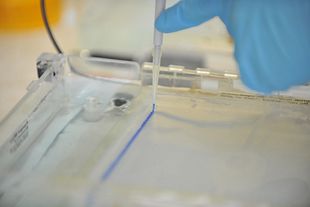The research project, funded with a three-year grant, aims to develop a new class of peptides in a preclinical phase. These are intended to induce insulin secretion via a specific signaling pathway while at the same time protecting pancreatic beta cells and preventing the instability of atherosclerotic plaques. "By means of in vitro studies, we will investigate the mechanisms of action of selected peptides and analyze the triggering of signaling in different cell types," said Professor Michael Roden, scientific director and chairman of the board of the DDZ. "This is a highly innovative project that we hope by the end of the funding period will produce a new peptide to improve the treatment of people with diabetes."
The joint project DIA-PEP aims to advance the preclinical development of a new class of peptides for the treatment of diabetes mellitus. The German Diabetes Center (DDZ) is collaborating with the following partners: Follicum AB (Lund, Sweden), Lund University and Bioassay GmbH (Heidelberg). The research cooperation project is supported by Eurostars, a joint funding program of EUREKA and the European Commission. The German Diabetes Center receives the project funding through the Federal Ministry of Education and Research.

